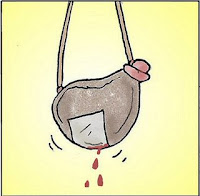'You should be a priest'
This was first said to me nearly 40 years ago, and the last time just lately. Every time it fell on infertile ground, but for very different reasons. Yet each time has remained in my memory. And I have to wonder why that is.
The first twice happened close together: once by a fellow-parishioner after I had given a talk on my involvement with our refugee family, and the second by a woman priest, who followed it with the question: ‘Don’t you get excited at the thought of baptizing someone?’, which I answered with a emphatic NO! I questioned in both these cases [albeit quietly to myself] why getting ordained was peoples’ first response to someone who was expressing their faith. Surely, there must be lay people who were as committed to their faith as clergy.
Fast forward 30 years, and once again I found a fellow-parishioner telling me the same thing, By this time however I had become articulate enough in my faith to be able to express that what I did as a committed lay person was just as important. Let’s just say she didn’t give up…but neither did I.
However it was said to me once again not all that long ago. And as I reflected on becoming a priest yet again, I realized that while my answer hasn't changed, my reasons for giving that answer have.
First of all, I have found a niche within the purview of the church, that allows me to follow my passion for educating and empowering lay people. The energy, passion and excitement generated at our weekly seminar sessions is not normally seen within the confines of the church building. Being a lay person myself, I am free from the necessity of 'following the party line' that hinders so many in the ordained community.

This brings to mind the parable told by Jesus about putting new wine into old bottles. ‘He (Jesus) also told them a parable: “... And no one puts new wine into old wineskins; otherwise the new wine will burst the skins and will be spilled, and the skins will be destroyed. But new wine must be put into fresh wineskins. And no one after drinking old wine desires new wine, but says, ‘The old is good.’” [Luke 5:36-39].
This is disconcerting, because if you believe literally in this teaching, as the institutional church seems to, then nothing new will come about. But what if this parable is trying to tell us that it is only through breaking the old that anything new will ever emerge. And that people are hard-wired to prefer the old to the new - not that the old is actually any better than the new! Just think how many times you have heard someone speak of 'the good old days'.

Comments
Post a Comment